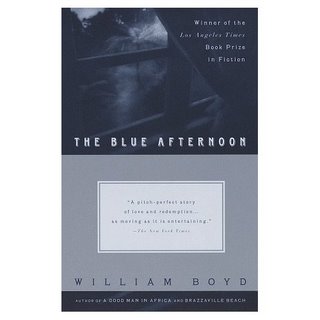
Most of the damage had been inflicted on the mass market paperback long before I came across it a couple of weeks ago in Myopic Books, the magnificent, multi-storied used book store in Chicago's Wicker Park neighborhood. Still, I was thrilled to find a copy of The Centaur in any condition stuck in the labyrinthine stacks. You see, about three years ago I embarked on a bizarre project to read all of John Updike's novels in the order they were written until I caught up to the present day or got sick of them. It was time for my yearly Updike fix.
I do things like this. I get an author in my teeth and I just won't let go. I've read virtually all of the novels by Philip Roth, Joyce Carol Oates, Reynolds Price, I.B. Singer and Bernard Malamud over the years. After I graduated from college, I was struggling with the basic question of what to read. I was bouncing around from one hokey title to the next. I'd read a mystery one week, a comedy the next. It wasn't very satisfying. I took a weekend trip back to my school and spoke to one of my old English professors about it and he said, "Find something you like and read everything you can by that author until you've had your fill."
Suddenly, the world of literature opened up to me again. I started going through authors like crazy. Julian Barnes grabbed my attention for awhile, then I switched to E.L. Doctorow before discovering T.C. Boyle. It worked well for many years. Now that I am the buyer for a book store, it's hard to do because of the enormous amount of pressure to constantly read new books. You just can't afford to get sucked into an author's backlist for weeks at a time.
At the Mountain & Plains trade show a couple of months ago, I was talking to a fellow book buyer, and we were both extolling the virtures of William Boyd's new novel Reckless. I mentioned how much I also enjoyed Boyd's novel Blue Afternoon and recommended that she read it.
 She said, "I never read back. I always read ahead. There's no time to go back and read it once it's out. It's over by then." Her comments made me feel a bit guilty because I'm not as diligent a reader of new books. It also made me sad: reading is such a personal pleasure for me. I can't totally subsume it within my job.
She said, "I never read back. I always read ahead. There's no time to go back and read it once it's out. It's over by then." Her comments made me feel a bit guilty because I'm not as diligent a reader of new books. It also made me sad: reading is such a personal pleasure for me. I can't totally subsume it within my job.I've learned to parcel out my favorite authors slowly over the course of the year. I read Wodehouse in the summer, Updike in the fall, Bellow (the greatest Jewish-American writer) at Christmas-time and Alice Munro's stories are for the interstices amidst the larger books. Spreading the books out like this has made the search for these titles all the more pleasurable.
I know that I could just go online and buy a copy of Updike's next novel for a buck, or even ask my sales rep for a free copy, but I prefer to haunt the used bookstores in city after city looking for one. My standards are pretty low. I won't accept highlighting or writing, and I want something that will hold together for at least one more reading -- that's it. I'm willing to wait. Last year, I never found The Centaur, and was forced to read his next novel, Of the Farm, instead.
My reading habits make me wonder about the customers I see in our store day after day. So many of them seem driven to find one particular book. It's almost always a brand new book with a slick marketing campaign. Often, they come in holding a clipping from a magazine or from the web. Several times a day we hear the magic words, "I heard it on NPR." Of course, the ultimate example of this in the book business is the Oprah Book Club. I can't tell you how many people raved about Janet Fitch's White Oleander when it was an Oprah selection. Now, we can't give her second book away. The publisher of Fitch's Paint in Black is already offering stores a rebate in the hopes that they will put it on the sale table for Christmas. I wonder what all these customers are missing by drowning out their own reading muse with the endless cacophony of media hype.
Back to The Centaur for a moment. What a magnificent novel. The opening chapter, about 50 pages long, is surreal. The lead character, a teacher named George Caldwell, is struck in the ankle by an arrow shot by an unruly student. He hobbles out on all four legs (he is a mythical creature after all) to the mechanic next door, who takes out the arrow and sends him back to school dripping blood on the ground. Once he's back in class, he teaches the history of life on earth from the Big Bang to the evolution of humans in one quick lesson. During the lesson, he has to discipline a student by cracking him on the back with the shaft of the arrow. The boy-creature's offense was that he was sexually mounting another student. All of this occurs while the lecherous school principal is doing Caldwell's monthly evaluation at the same time as fondling a female student.
After that opening, the novel settles down into an extremely realistic rendering of two days in the life of the teacher and his son in 1947 rural Pennsylvania. Caldwell gets written up for striking the student, everyone goes back to having two legs and the mythical allusions are harder to spot. We see the father and son dealing with small hardships: their car breaks down, they are stranded in a snowstorm and a painful tooth must be extracted -- trivialities that certainly wouldn't interest Zeus, or even a more minor deity.
Updike's language, as always, is impeccable. His descriptions, particularly those of nature and of people, are both quirky and dead on. He can imbue the image of the shadow of a falling snowflake with tension. His characters are sympathetic and often hilarious. The teacher, who has survived the Great Depression only to succumb to every neurosis the modern world has invented, is a wholly original man. He's fighting his own inner demons and constantly gnawing on his own perceived inadquacies while still fulfilling his role as father, teacher and bread-winner.
The New York Times ran a review in 1963 that was lukewarm at best. I think the reviewer might have been just a little old fashioned judging from his last line: "One other aspect of The Centaur must be pointed out. It contains numerous obscenities, no more loathsome than in many recent novels, but entirely unnecessary." You can view the whole review at http://www.nytimes.com/books/97/04/06/lifetimes/updike-r-centaur.html

Now, I'm on the prowl for a beat-up copy of Couples, Updike's novel from 1968. In the meantime, I've got the new collection of Alice Munro stories, The View from Castle Rock, to keep me occupied. I want to read it before my guilt gets the better of me, and I pick up some pristine advance reader's copy of a must-read novel that won't be half as good as a dozen cruddy old books I could discover in the tight aisles of an unkempt used book store.









